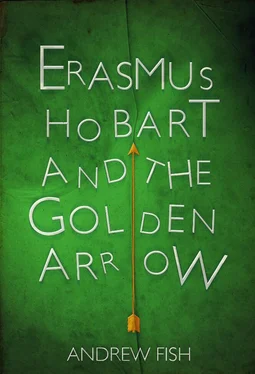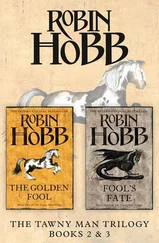Barnstaple, knowing Erasmus wouldn’t back down and unwilling to undergo an entire hour’s detention, held up a small wooden device.
‘I was testing this,’ he admitted.
‘Bring it here,’ Erasmus demanded. Barnstaple made his way to the front, the line of boys leaning against the wall to let him pass, whilst simultaneously staring curiously at the contraption. Erasmus took the device from the boy and examined it closely.
‘It’s a catapult,’ Barnstaple explained.
‘I can see that,’ Erasmus told him. ‘More accurately, of course, you should call it a trebuchet. Now what are you doing throwing people’s sandwiches with a piece of siege artillery?’
‘I thought they might want to use it in the play.’
‘I see. This would be the famous production of Robin Hood, would it?’
Barnstaple nodded.
‘And where in the legends does it say that the outlaws fired sandwiches from trebuchets, hmm?’
Barnstaple shrugged. ‘They had them back then,’ he managed.
‘Trebuchets, yes,’ Erasmus agreed. ‘However, I believe they were somewhat short of sandwiches and, even if they weren’t, I doubt it would ever have occurred to them to use them as ammunition.’
‘The French used to throw animals over castle walls,’ someone contributed. ‘Perhaps the English just used to throw their lunch.’
Erasmus looked up, trying to find the source of the comment, one eyebrow raised quizzically. He identified the source of the comment as Atkinson and looked at him levelly. ‘Do you understand why the French threw cows over castle walls?’ he asked.
‘Because they had BSE?’ Atkinson suggested.
‘In the thirteenth century,’ Barnstaple sneered.
Erasmus looked at Barnstaple sternly and the boy fell silent. ‘Believe it or not, Atkinson,’ Erasmus continued, looking back towards the boy, ‘you’re actually thinking in the right area. It was common in siege warfare to hurl diseased animals into besieged castles – the idea was that the disease would spread amongst the inhabitants and lead to an early surrender. However, I fail to see what relevance this has to Robin Hood.’ He looked down at Barnstaple once more.
‘I was just getting into it,’ said Barnstaple. ‘You know, history and all that.’
Erasmus pushed back the classroom door and ushered the pupils to their seats. He handed Harrison his sandwiches as he passed. Once the last few pupils had filtered past, he closed the door and made his way to his desk.
‘Taking an interest in history is very commendable,’ he told the class as they stood quietly behind their desks, ‘but plays about Robin Hood actually say very little about the history of this country. In fact, there are significant elements of the plays which flatly contradict history as we know it.’
He motioned for the class to sit and, as they complied, he surveyed them: there did seem to be a spark of genuine interest, even if it had initially revolved around a practical interest in siege weaponry.
He waited for the noises of scraping chairs and low murmuring to subside, then addressed the class. ‘Can anyone give me an example of a historically dubious aspect of the Robin Hood legend?’ he asked.
Harrison raised his hand, eager to be the first to answer. Erasmus decided not to choose the boy: he’d already embarrassed Barnstaple once this morning and it wouldn’t do to let him draw too much attention to himself – not with double physics after lunch, anyway.
‘Heathfield,’ he called out, noticing the child was holding his left arm up and supporting it with his right as if it were becoming burdensome.
‘Marian, sir,’ Heathfield said.
‘What about Marian?’
‘My dad says she didn’t exist, sir.’
‘Does he now? And what makes him say that?’
‘He says that women knew their place in the Middle Ages, sir, and that they didn’t go out partying with their friends to all hours of the night.’
Erasmus tried hard not to smile: Heathfield Senior’s remarks often said more about the insecurities of twenty-first century man than they did about the position of twelfth- or thirteenth-century woman. He noticed Harrison had put his sandwiches on the edge of the desk – should he tell the boy to put them away? He didn’t understand why Harrison had to wave his sandwiches around like that anyway – did he think they’d run away if he left them in his bag?
‘I was told the French made her up,’ Atkinson contributed. ‘She wasn’t in the early legends and the French added her in.’
‘Why would the French do that?’ Barnstaple challenged.
‘Hufter,’ Atkinson sneered. ‘We were all French back then anyway – that’s just like saying we made it up.’
‘If we were French, why were they called Normans, then?’
‘Everyone was called Norman, that’s why they invented surnames – ’cos it got too confusing.’
Erasmus banged on the desk with his board rubber. ‘Can we have a little order?’ he asked. The room fell silent, except for a few murmurings from Barnstaple, still seething at being insulted.
‘Now,’ Erasmus continued. ‘The example I had in mind is the return of King Richard – that’s been a part of the legend for as long as we can trace it back. Historically, it seems extremely unlikely. Richard spent most of his time out of the country and there’s plenty of evidence he didn’t care about the place in the slightest. Even if we allow for the possibility that Robin could have met the King during the siege of Nottingham Castle, it seems unlikely that standing up for the rights of English peasants would have pleased Richard. Marian is an interesting one, though. It’s widely held she was, as Atkinson pointed out, added by French-inspired romantics at roughly the same time that Guinevere was added to the legend of King Arthur, but a new school of thought has it that Marian was part of the original legends and was removed by chroniclers of the day, possibly because they shared the opinions of Heathfield’s father.’
There were a few chuckles around the room and Heathfield’s face flushed red.
‘Please, sir,’ Harrison held his arm so high Erasmus wondered at how he didn’t dislocate it.
‘Yes, Harrison,’ Erasmus prompted, expecting one of Harrison’s regular requests for the lavatory.
‘Did Robin Hood really exist?’ Harrison asked.
Erasmus sat down on the edge of his desk. ‘That’s difficult to say,’ he admitted. ‘It’s usually true that legends have at least some historical basis, but it’s very hard to tell how much of the legend is attributable to a real person.’
‘Can’t you just look up his birth certificate?’
Erasmus smiled. ‘They hadn’t started keeping them back then,’ he said. ‘But there are Robin Hoods in the records.’ He noted Harrison’s sudden look of enthusiasm. ‘They’re all years later,’ he said.
‘What about going back to the earliest version of the legend?’ Atkinson asked.
Erasmus shook his head. ‘No,’ he said. ‘The trouble with legends like Robin Hood is that they usually begin as an oral tradition. The first written stories of Robin appear at least a hundred years after the time of King John and it’s possible these left out elements, like Marian, which were added by later writers who knew some of the oral traditions. It’s also possible the original writers added some of the political material of their own time to the message.
‘Robin, we are told, robbed from the rich to give to the poor, but this was supposed to happen at a time when we’re told money wasn’t in wide circulation. Peasants were living off the land and they paid for the rights to that land by working the lands of their masters. Their masters mostly earned their keep by means of military service.’
Читать дальше











